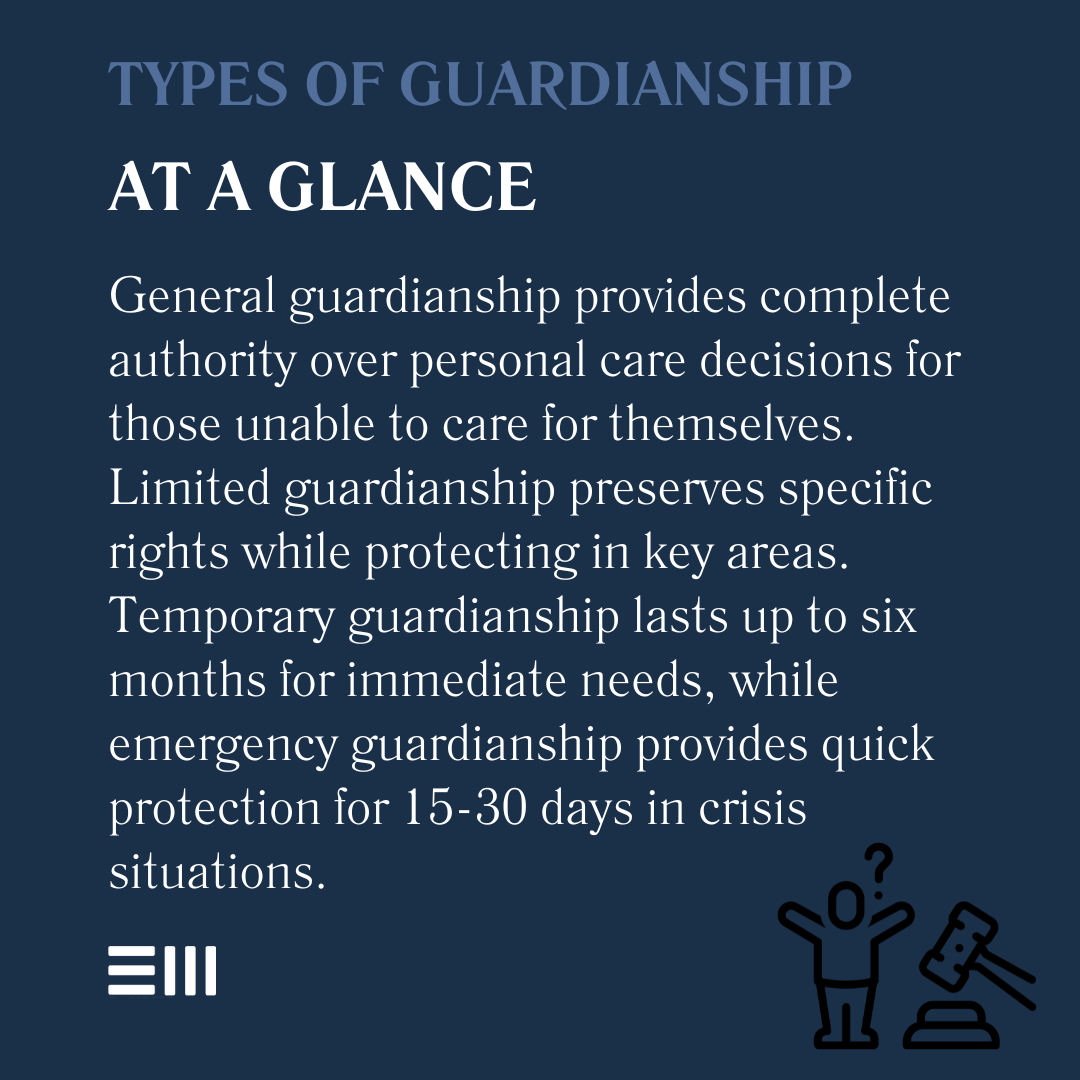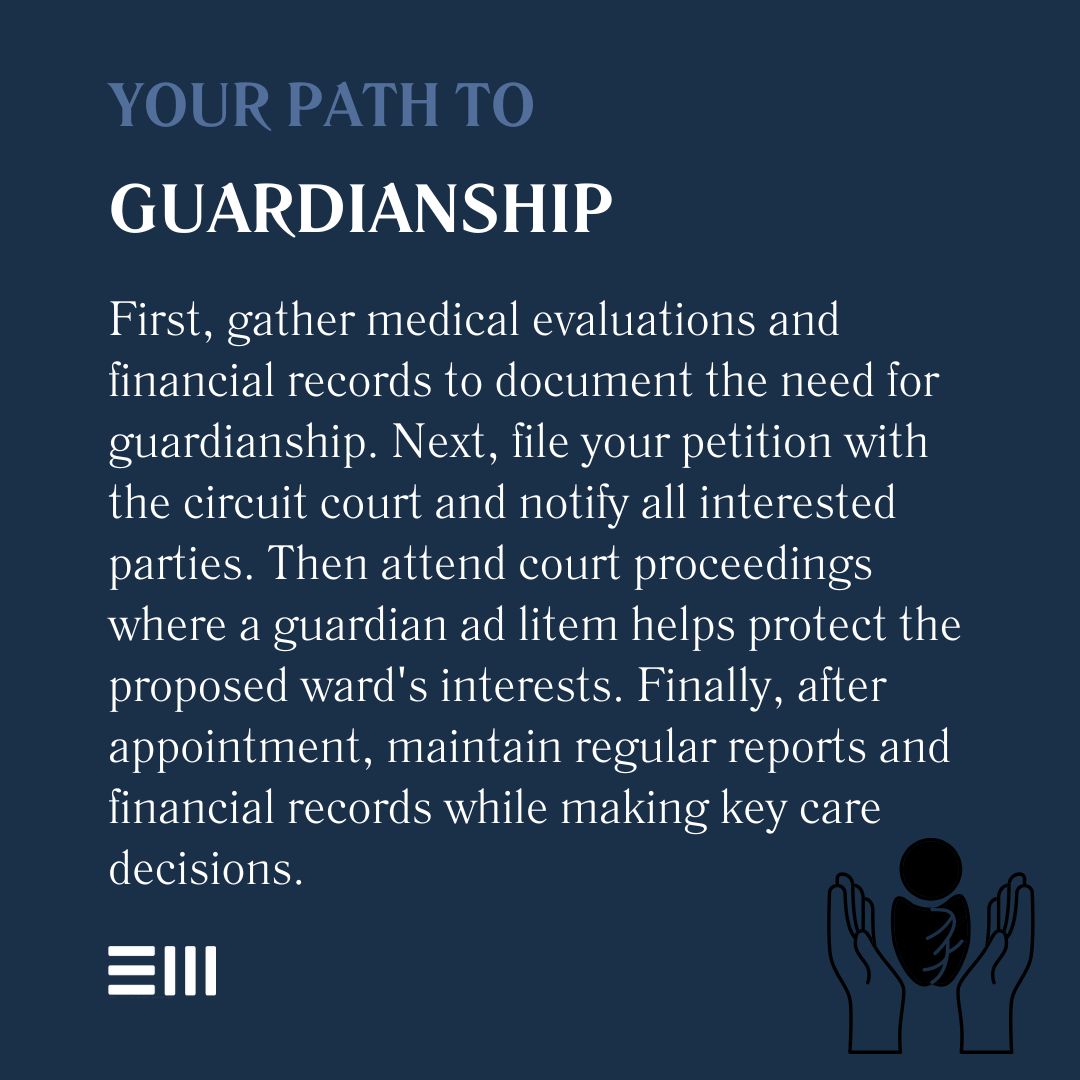Nearly 1.3 million adults in the United States are under legal guardianship, with thousands of new cases filed each year in Alabama alone.
Behind each case lies a family facing difficult decisions about protecting their loved ones' well-being.
Whether you're considering guardianship for an aging parent showing signs of cognitive decline or a special needs child approaching adulthood, understanding Alabama's guardianship laws and having proper legal representation can make a significant difference in securing your family's future.
Understanding Legal Guardianship in Alabama
Legal guardianship represents a significant responsibility recognized by Alabama courts. When someone becomes unable to make sound decisions about their health, finances, or daily care, the court may appoint a guardian to protect their interests and well-being.
From elderly parents facing cognitive decline to minor children with special needs, guardianship provides a legal framework for ensuring proper care and protection.
Alabama distinguishes between guardianship of the person, which covers healthcare and personal decisions, and conservatorship, which handles financial matters. Understanding these distinctions helps families make informed choices about the level of legal protection their loved ones need.
Types of Guardianship in Alabama
Before exploring specific guardianship arrangements, families should understand the various options available under Alabama law. Each type serves different needs and comes with distinct responsibilities.
General Guardianship
- Full authority over personal care decisions;
- Typically appointed for individuals wholly incapable of self-care;
- Requires comprehensive documentation of incapacity; and
- Regular reporting to the court on ward's condition.
Limited Guardianship
- Restricted to specific areas of decision-making;
- Preserves ward's rights in certain aspects of life;
- Tailored to individual's capabilities and needs; and
- More flexible than general guardianship.
Temporary Guardianship
- Short-term arrangement for immediate needs;
- Usually limited to 6 months or less;
- Requires clear showing of emergency; and
- Can be converted to permanent guardianship if needed.
Emergency Guardianship
- Immediate appointment in crisis situations;
- Typically lasts 15-30 days;
- Requires evidence of immediate harm risk; and
- Limited to essential decisions only.
Understanding these options helps families choose the most appropriate arrangement for their situation while preserving as much independence as possible for their loved ones.
The Guardianship Process in Alabama
Securing guardianship involves several carefully structured steps designed to protect both the proposed ward and their family members.
Understanding this process helps families prepare effectively and avoid unnecessary delays.
Initial Assessment and Documentation
- Medical evaluation of proposed ward;
- Gathering of financial records;
- Documentation of daily living capabilities; and
- Collection of relevant medical history.
Legal Filing Requirements
- Petition for guardianship with circuit court;
- Notice to all interested parties;
- Background check of proposed guardian; and
- Financial disclosure statements.
Court Proceedings
- Initial hearing scheduling;
- Appointment of guardian ad litem;
- Testimony from medical experts; and
- Evidence presentation.
Post-Appointment Responsibilities
- Regular reporting to court;
- Financial accounting requirements;
- Updates on ward's condition; and
- Ongoing documentation of decisions.
Each step in this process serves to protect the interests of all parties involved while ensuring proper oversight of guardianship arrangements.
Rights and Responsibilities of Guardians
Taking on guardianship duties creates specific legal obligations while granting necessary authority to care for the ward.
Understanding these elements helps guardians fulfill their roles effectively.
Guardian's Rights
- Access to medical records;
- Authority to make healthcare decisions;
- Control over living arrangements; and
- Management of daily care needs.
Guardian's Responsibilities
- Regular court reporting;
- Financial accountability;
- Healthcare coordination; and
- Protection of ward's rights.
Legal Limitations
- Major property transactions require approval;
- Cannot make certain end-of-life decisions;
- Must respect ward's known preferences; and
- Regular court oversight required.
Best Practices
- Maintain detailed records;
- Consult professionals when needed;
- Regular communication with family; and
- Ongoing education about duties.
A proper understanding of these rights and responsibilities helps guardians provide effective care while maintaining legal compliance.
Common Challenges in Guardianship Cases
Navigating guardianship cases often presents unique challenges that require careful consideration and professional guidance. Understanding common obstacles helps families prepare effectively.
Family Disagreements
- Conflicts over guardian selection;
- Disputes about care decisions;
- Disagreements on asset management; and
- Communication breakdowns.
Legal Complexities
- Jurisdiction issues;
- Property management rules;
- Healthcare decision limitations; and
- Reporting requirements.
Financial Considerations
- Cost of ongoing care;
- Asset management duties;
- Insurance coordination; and
- Budget planning.
Administrative Burdens
- Regular court reports;
- Documentation requirements;
- Healthcare coordination; and
- Time management demands.
Recognizing these challenges early helps families develop effective strategies for addressing them proactively.
Frequently Asked Questions About Legal Guardianship in Alabama
Families often have numerous questions when considering guardianship.
Here are answers to common inquiries about the process and requirements in Alabama.
How Long Does the Guardianship Process Take in Alabama?
The timeline varies depending on case complexity but typically takes 2-3 months from filing to appointment. Emergency guardianships can be processed more quickly when an immediate need exists.
What Are the Costs Associated with Obtaining Guardianship?
Expenses include court filing fees, attorney fees, medical evaluation costs, and guardian ad litem fees. Total costs typically range from $2,000 to $5,000 for uncontested cases.
Can a Guardian Be Removed or Changed?
Yes, the court can remove or replace guardians who fail to perform their duties or act against the ward's interests. Interested parties can petition for guardian removal with proper cause.
What Is the Difference Between Guardianship and Power of Attorney?
Guardianship requires court appointment and oversight, while a competent individual voluntarily grants power of attorney. Guardianship provides broader authority and continues despite incapacity.
Does the Ward Retain Any Rights Under Guardianship?
Yes, wards retain all rights not specifically granted to the guardian. Courts prefer limited guardianships that preserve as many rights as possible while ensuring necessary protection.
How Often Must Guardians Report to the Court?
Alabama requires annual reports on the ward's condition and financial accounting. Additional reports may be required based on specific case circumstances.
Protect Your Loved Ones' Future Today
Every day matters when it comes to protecting vulnerable family members. Our experienced legal team understands the complexities of Alabama guardianship law and provides compassionate guidance through every step of the process.
From initial assessment to ongoing compliance, we ensure your family's interests are protected while maintaining dignity and respect for all involved.
Contact us today for a confidential consultation about your family's guardianship needs. Our dedicated attorneys will help you understand your options and develop a plan that serves your loved one's best interests.


